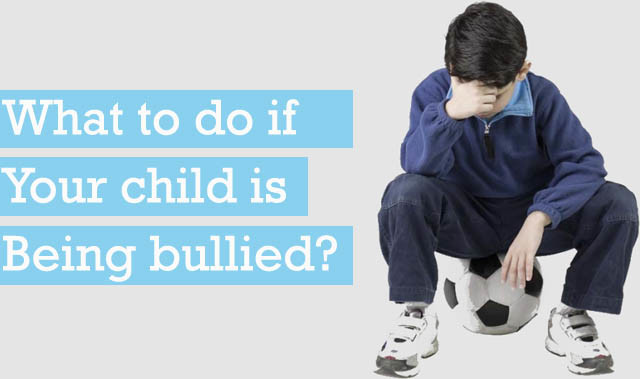It is most disturbing to know that your child is being bullied. You feel sad, angry, tearful, depressed and helpless. The gamut of emotions that pass through you can confuse and overwhelm a child even further. What you should and shouldn’t do when your child informs you that she is being bullied will have a big impact on her. It can teach her a few lessons on how to handle the issue.

How to find out if your child is being bullied?
Look out for these signs in your child. These may be indicative of your child being bullied.
- If certain phone calls, messages or emails are getting your child upset.
- If the child shows reluctance in attending school.
- If the child does not seem happy in company and prefers to spend time alone.
- If the child does not use the bathroom at school. (Most bullying incidents take place in school bathrooms)
- If the child is skipping the activities that they used to enjoy before.
- If the child seems to be losing the friends, they had before.
If you notice one or more of these signs in your child, have a talk with them and find out the reasons behind the same. Many children blame themselves for what is happening to them and do not open up to parents and teachers about these incidents.
What you should do?
- Make clear and comprehensive records about what the bullies do, date, time, place, threats made and action.
- Teach your child how to react to bullying. Bullies bully to get a reaction. Role-play with your child and teach them not to react. Tell them who they should go to, if they feel unsafe.
- Contact a teacher or administrator at school who can help you. Schools are responsible to stop bullying. If the incidents take place away from school too, you might need to talk to local police too.
- Keep your child talking. Don’t allow them to shut themselves up. Let them talk to whoever they please – counsellors, teachers, parents, grandparents, etc. Don’t feel upset if they don’t feel comfortable sharing with you.
- Support your child and do not ever blame them for what is happening to them. Always take your child’s side.
- Do not punish your child for anything they do to protect themselves from the bully. This is especially true when there is physical bullying involved. If your child hits back when hit, then do not punish him for that.
What you shouldn’t do?
- Do not personalize what is happening to your child. You may have been bullied as a child. Don’t compare the incidents and bring up your pent-up emotions into this incident.
- Do not attack the bully.
- Do not confront the parents of the bully.
What helps the child immensely in these situations is to find something they enjoy doing. Find something they are good at, enroll them for classes and encourage them verbally. They might even find some new friends at these classes and overcome the traumas of bullying.































Any type of bullying against your child must be taken up seriously. The happenings of this age will have a major impact on their mindset in a long term. You must be the best of the friends of your child. It is necessary for you to note the behaviour of your child. Befriend his friend circle, keep a check on his online activities and do not forget to have a look at his phone from time to time for unauthorized calls or the texts.